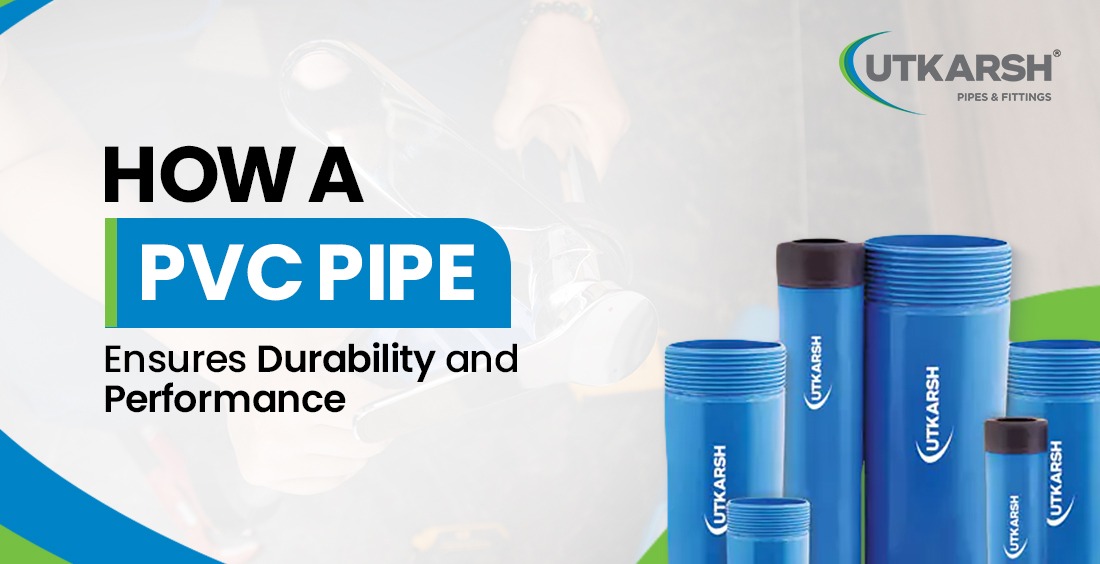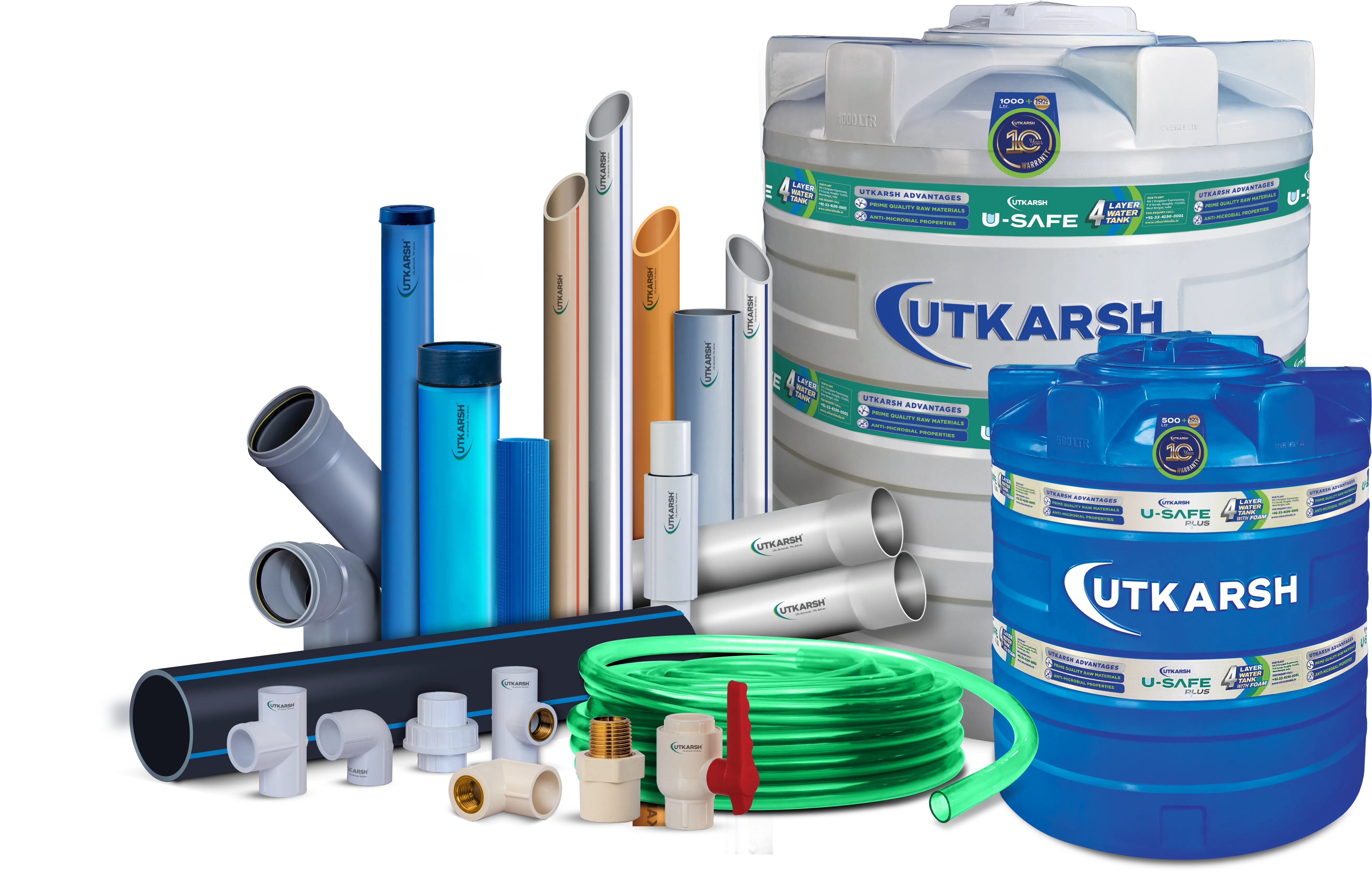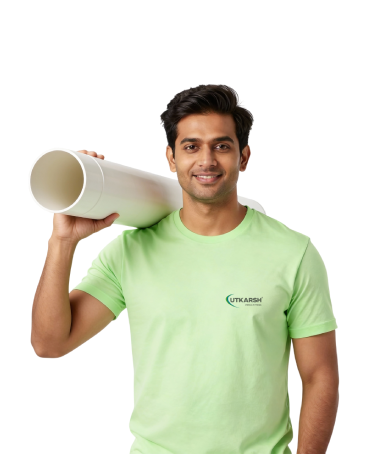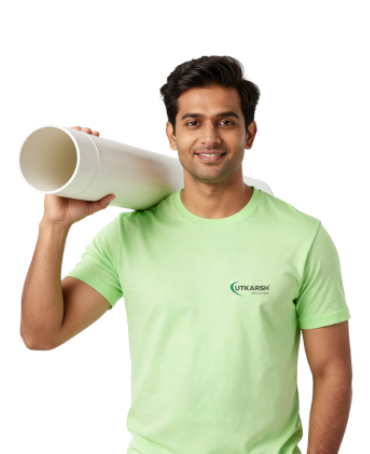How a PVC Pipe Ensures Durability and Performance

Have you ever wondered how PVC pipes are able to withstand rot while being buried underneath roads or kept under the kitchen sink? The PVC pipe production process effectively integrates raw materials, mechanical engineering, and quality assurance, which is the reason, unlike many other materials, it does not require maintenance.
Before we dissect how exactly a pipe is designed to endure strong pressure, let’s focus on what makes a PVC pipe robust.
It All Starts with the Right Recipe – The Core of the PVC Pipe Production Process
Durability of products always starts from the blend of raw materials, and in the case of PVC, it begins with resins. The PVC pipe production process starts with routers and ducting polyvinyl chloride resin and combining it with stabilizers, lubricants, and impact modifiers. But why all these additions? Every ingredient in the mix comes with a purpose that maintains the longevity of the pipe, its resistance to sunlight, and how well it withstands pressure.
The outcome would be a malleable pipe capable of withstanding high pressure and expanding strength and flexibility attributes.
Extrusion - the Stage where the Pipe Shape is Formed
The next stage is referred to as extrusion. During the extrusion stage of the PVC pipe production process, the temperature of the mix is increased. This is done by putting it into a high-temperature extruder which melts the blend. The blend is then poured through a die which gives it the shape of a cylindrical pipe.
Temperature and pressure control also contributes to the overall quality of the piping. Proper settings guarantee that the surfaces are even, walls do not crack, thickness is uniform, and smooth surfaces are achieved. The pipe design affects the durability of the pipe in regards to water pressure, soil shift, and general usage.
Cooling and Sizing – Locking in the Strength
The next step in the PVC pipe production process is where things literally cool down. After shaping, pipes are cooled using a vacuum sizing process and water baths to lock in their dimensions and mechanical strength.
Here, the pipes are also aligned precisely to avoid bending or warping. This ensures they stay straight and fit seamlessly into systems, reducing stress on joints and fittings.
Quality Assurance in PVC Pipe Manufacturing – No Compromise
This is where the magic gets verified. Quality assurance in pvc pipe manufacturing isn’t a one-time test but an ongoing process. Each batch of pipes is tested for tensile strength, impact resistance, hydraulic pressure, and UV resistance.
Whether it’s for home plumbing, agricultural irrigation, or industrial pipelines — quality tests make sure the pipe is ready for the job. The pipes that don’t pass? They don’t leave the facility.
Strong quality assurance practices ensure every PVC pipe offers the kind of performance users expect — leak-free, durable, and safe.
Know more: How PVC Pipe Thickness Affects Quality and Durability | Utkarsh India
Smooth Interiors = Better Performance
Another perk of the PVC pipe production process is how it creates ultra-smooth interiors. This smoothness reduces friction and lets water or fluids flow faster with less resistance. That means less energy is needed for pumping, fewer clogs, and better long-term efficiency.
This detail might seem small, but it’s a big reason why PVC pipes outperform alternatives in real-world usage.
Customization for Specific Applications
A great advantage of the modern PVC pipe production process is customization. Pipes can be manufactured in different diameters, pressure ratings, and lengths depending on their use.
Thanks to quality assurance in pvc pipe manufacturing, even customized pipes go through the same strict tests. So, whether it’s a lightweight casing pipe for a borewell or a heavy-duty pipe for municipal drainage, performance is never compromised.
Before we wrap up, here’s a name that gets durability and performance just right — Utkarsh Pipes & Fittings. As a trusted pvc pipe manufacturer, we’ve built a reputation for delivering consistent quality across a wide range of products.
Our uFLO uPVC pipes, cPVC pipes, and PVC Casing pipes are designed with care and go through a precise pvc pipe production process to meet industry standards. Backed by strict quality assurance in pvc pipe manufacturing, our pipes are built for long-term reliability in any condition.
Check this out: The Lifespan of uPVC Pipes: Tips for Long-Lasting Performance
Summary
PVC pipes are more than just plastic tubes — they’re a result of innovation, testing, and careful production. The PVC pipe production process ensures every pipe is crafted for performance, and with tight quality assurance you know you’re getting value for money.
FAQs:
What are the performance characteristics of PVC?
PVC offers high durability, corrosion resistance, chemical resistance, low maintenance, smooth flow, and strong mechanical strength, making it ideal for long-term use.
What is the strength of a PVC pipe?
The strength of PVC pipe typically ranges from 7,000 to 8,000 psi (pounds per square inch) in tensile strength, making it highly durable and resistant to pressure and impact.
Do all PVC pipes go through the same testing process?
In standard practice, yes. Reputable manufacturers include quality assurance in pvc pipe manufacturing across all product lines to ensure consistency and durability regardless of pipe type or size.












